- Home
- Prelims
- Mains
- Current Affairs
- Study Materials
- Test Series
 EDITORIALS & ARTICLES
EDITORIALS & ARTICLES
Hit List Questions 69-PPP 100 PRELIMS 2024 - 87
Questions & Explanations:
|
1. |
Consider the following statements w.r.t. Hepatitis: 1. Hepatitis A and E are transmitted through contaminated food and water. 2. Hepatitis B can be prevented by medication. 3. Hepatitis C can be cured with vaccination. 4. Hepatitis D can only infect those who are already infected with hepatitis B. Which of the statements given above is/are correct?. (a) 1 & 4 (b) 2 & 3 (c) 1, 2 & 3 (d) 2 & 4
|
|
2. |
(1) Effective Exchange Rate is an index of the simple average of the rupee’s exchange rates vis-à-vis the currencies of India’s major trading partners. (2) Real effective exchange rate does not factor in inflation. (3) An increase in Nominal Effective Exchange Rate indicates the appreciation of rupee. Which of the above is/are correct?. (a) Only 3 (b) Only 2 & 3 (c) Only 1 & 3 (d) 1, 2 & 3
|
|
3. |
Consider the following statements: 1. Article 176 of the constitution provides for customary address by Governor in State assembly. 2. Governor has no discretion in reading out the text of the address. Which of the following statements is/are correct? (a) Only 1 (b) Only 2 (c) Both 1 and 2 (d) Neither 1 Nor 2
|
|
4. |
Who is the founder of the Charvaka School of philosophy?. (a) Kumarila Bhatta (b) Sabar Swami (c) Jaimini (d) Brihaspati
|
|
5. |
Consider the following statements: 1. Thermal expansion of water contributes to sea level rise. 2. Sea level rise leads to saltwater contamination of freshwater aquifers. 3. Weakening of El Niño most likely slows down the rate of sea level rise. Which of the above statements is/are correct? (a) 1 only (b) 3 only (c) 1 and 2 only (d) 1, 2 and 3
|
|
6. |
Who composed ''Dohas''? (a) Kabir (b) Ramananda (c) Jayadev (d) Namdeva
|
|
7. |
Consider the following statements: 1. Green Ammonia is produced by the Haber process. 2. Ammonia cannot be used in a fuel cell. Which of the statements given above is/are incorrect? (a) 1 only (b) 2 only (c) Both 1 and 2 (d) Neither 1 nor 2
|
|
8. |
Who is charged with destroying the glorious Buddhist University of Nalanda in Bihar, and is said to have mistaken it for a military camp?. (a) Muhammad Ghori (b) Qutb-ud-din Aibak (c) Iltutmish (d) Bhakthiyar Khalji
|
|
9. |
Consider the following Statements. 1. Article 47 can be used to justify a restriction on citizens’ rights under Article 19(1)(g). 2. Article 47 of the Constitution places a duty on the State to “raise the level of nutrition and the standard of living and to improve public health”. Which of the above statement is/are correct? (a) 1 only (b) 2 only (c) Both 1 and 2 (d) Neither 1 nor 2
|
|
10. |
Which of the following statements is/are true w.r.t. the Carbon Credit Trading Scheme of India?. 1. It takes into account the mandatory implementation for the ‘obligated’ entities but excludes voluntary markets. 2. It allows Indian companies to trade Carbon credit certificates in domestic as well as foreign markets. (a) 1 only (b) 2 only (c) Both 1 and 2 (d) Neither 1 nor 2
|
|
11. |
Consider the following statements w.r.t. Hydrofluorocarbons: Statement-I: They have zero Ozone Depletion Potential. Statement II: They have no chlorine. Which one of the following is correct in respect of the above statements? (a) Both Statement-I and Statement-II are correct and Statement- II is the correct explanation for Statement- I (b) Both Statement-I and Statement-II are correct and Statement- II is not the correct explanation for Statement-I (c) Statement I is correct but Statement II is incorrect (d) Statement I is incorrect but Statement II is correct
|
|
12. |
Which of the following statements are correct regarding ‘Dashavtar Temple’ of Deogarh?. 1. It was built during Gupta period and is dedicated to Lord Vishnu. 2. It is the first pyramidal shaped temple of India. 3. It is the first brick temple of India. (a) 1, 2 and 3 (b) 2 only (c) 1 & 2 only (d) 2 &3 only
|
|
13. |
Which one of the following is the odd one out? (i) Udayagiri cave (ii) Ellora caves (iii) Elephanta cave (iv) Bagh cave (a) iii (b) i (c) ii (d) iv
|
|
14. |
Consider the following statements w.r.t. Meguti Temple. 1. It is a Jain temple. 2. It is well known for its Aihole Prashasti inscription. Which of the statements given above is/are correct? (a) 1 only (b) 2 only (c) Both 1 and 2 (d) Neither 1 nor 2
|
|
15. |
Which of the following statements is/are correct w.r.t. Khooni Bhandara?. 1. It is an underground water management system comprising eight waterworks. 2. It was built by Palas. Select the correct answer using the code given below: (a) 1 only (b) 2 only (c) Both 1 and 2 (d) Neither 1 nor 2
|
|
16. |
Consider the following statements about Ajanta cave paintings. 1. The subject matter of these paintings is Buddhist. 2. They were done under the reign of Sunga and Guptas. 3. They used tempera style. Which of the above statements is/are correct? (a) 1, 2 and 3 (b) 2 only (c) 1 and 3 only (d) 3 only
|
|
17. |
Which of the following are a part of “Barabar Caves”?. 1. Lomas Rishi Caves 2.Sudama caves 3. Karan Chaupar caves (a) 1 and 3 only (b) 2 and 3 only (c) 1 and 2 only (d) 1, 2 and 3
|
|
18. |
Citizenship Amendment Act (CAA) is inapplicable to the 1. Tribal areas included in the 6th Schedule of the Constitution 2. Areas falling under the Inner Line Permit system 3. Scheduled Areas included in the 5th Schedule of the Constitution Which of the statements given above is/are correct? (a) 2 only (b) 1, 2 and 3 only (c) 1 and 2 only (d) 2 and 3
|
|
19. |
“Berenice Troglodytica” seen in news sometimes in the recent past refer to (a) an ancient seaport (b) a petrified fossil (c) a curious bronze dancing girl with Indus script (d) an extinct variety of Red Sanders tree
|
|
20. |
Consider the following pairs : Volcanoes Place 1. Mayon : Brazil 2. Popocatépetl : Phillipines 3. Merapi : Indonesia How many of the above pairs are correctly matched? (a) Only one pair (b) Only two pairs (c) All three pairs (d) None of the pairs
|
|
21. |
Which is ‘Pineapple Express?’ (a) It is a long, narrow region of water vapour in the atmosphere. (b) It is a train recently launched by Indian Railways with UV radiation facilities to disinfect the coaches. (c) It is a hot and dry wind in Europe that favours the growth of Pineapples. (d) It is a cold ocean current found in Arctic Sea.
|
|
22. |
Ancient Indian record that is the earliest royal order to preserve food-grains to be utilized during the crises in the country is (a) Sohgaura Copper-plate (b) Rummindei Pillar-edict of Ashoka (c) Udyagiri Caves (d) Brihat inscriptions
|
|
23. |
Theistic schools of Indian philosophy are (a) Nyaya and Vaishisika (b) Sankhya and Mimansa (c) Nyaya and Mimansa (d) Sankhya and Nyaya
|
|
24. |
1. They are sessile. 2. They are Cnidarians. 3. They have a symbiotic relationship with zooxanthellae. 4. They lock carbon in their skeletons. Which of the above statements is/are correct w.r.t. Corals? (a) 1 and 2 only (b) 1, 2, 3 and 4 (c) 2 and 3 only (d) 2, 3 and 4
|
|
25. |
The Havana Syndrome is a (a) neurological illness (b) liver disease (c) endocrinal disorder (d) muscular enzymatic disorder
|
EXPLANATIONS
|
1. |
A |
|||||||||||||||||||||||||||||||||||
|
2. |
Effective Exchange Rate is an index of the weighted average of the rupee’s exchange rates vis-à-vis the currencies of India’s major trading partners. https://indianexpress.com/article/explained/explained-economics/rupee-modi-government-9285946/ |
A |
||||||||||||||||||||||||||||||||||
|
3. |
Constitutional provision regarding customary address: · The origin of the practice of customary address can be traced to the Government of India Act, 1919. · Article 87: President shall address both houses of the Parliament assembled together at the commencement of the first session after each general election to the House of People and at the commencement of the first session of each year. · Provisions regarding the address shall be made by the respective houses i.e. Lok Sabha and Rajya Sabha respectively. · Article 176: Governor shall address the state legislative assembly and in case of state legislative council, both the houses together. · Provisions regarding the address shall be made by the respective houses. Growing conflict in reading out the customary address: · Kerala Governor Arif Mohammad Khan modified the portions of the text of customary address on his discretion. Meanwhile, this has been the case in many non -BJP ruled states like West Bengal and Tamil Nadu. · Article 163– There shall be a Council of Ministers with the Chief Minister at the head to aid and advise the Governor in the exercise of his functions, except in so far as he is by or under this Constitution required to exercise his functions or any of them in his discretion. · If any question arises whether any matter is or is not a matter required to act in his discretion, the decision of the Governor in his discretion shall be final, and the validity of anything done by the Governor shall not be called in question on the ground that he ought or ought not to have acted in his discretion. · But, Governor has used the above discretion provision in exercising discretion in delivering customary address. · Important Cases related to Customary Address · In Yogendra Singh Handa vs State of Rajasthan (1967), Rajasthan High Court held that some portion read by governor was good enough to deem the whole address as read (Context: Then Rajasthan governor did not read the full address). · In the Abdul Ghafoor Habibullah case, Kolkata high court held that governor cannot decline to deliver his address and refuse to fulfil his constitutional duty. |
A |
||||||||||||||||||||||||||||||||||
|
4. |
https://nios.ac.in/media/documents/SecICHCour/English/CH.08.pdf |
D |
||||||||||||||||||||||||||||||||||
|
5. |
https://indianexpress.com/article/explained/explained-climate/sea-level-rise-9284789/ |
D |
||||||||||||||||||||||||||||||||||
|
6. |
· https://nios.ac.in/media/documents/SecICHCour/English/CH.09.pdf |
A |
||||||||||||||||||||||||||||||||||
|
7. |
· Green ammonia, also known as sustainable or renewable ammonia, is an innovative and eco-friendly form of ammonia production that is gaining prominence in the global energy landscape. · It is produced using renewable energy sources, such as wind, solar, or hydropower, and serves as a promising energy carrier with applications in various sectors, including agriculture, transportation, and energy storage. Production of Green Ammonia · Haber-Bosch Process: Traditional ammonia production relies on the energy-intensive Haber-Bosch process, which consumes a significant amount of natural gas and emits substantial greenhouse gases (GHGs), mainly carbon dioxide (CO2). · Electrolysis: Green ammonia production involves an alternative approach called "electrolysis," which utilizes renewable electricity to split water (H2O) into hydrogen (H2) and oxygen (O2). This hydrogen is then used to synthesize ammonia (NH3) through the Haber-Bosch process, but with zero carbon emissions. · Renewable Energy Sources: The key to green ammonia production is the use of renewable energy sources, such as solar, wind, or hydropower, to power the electrolysis process. This ensures that the entire production cycle is emissions-free. Applications of Green Ammonia · Agriculture: Green ammonia can serve as a sustainable and carbon-neutral source of fertilizer. It can replace traditional ammonia-based fertilizers, which are carbon-intensive to produce, thereby reducing the carbon footprint of agriculture. · Energy Storage: Green ammonia can be used as an energy carrier and energy storage medium. Hydrogen, a component of ammonia, can be extracted when needed to generate electricity or serve as a fuel for fuel cells, making it a versatile energy storage solution. · Transportation: Ammonia can be used as a clean and efficient fuel in the transportation sector. It can power fuel cell vehicles or be utilized in ammonia-powered combustion engines, reducing emissions. · Industrial Processes: Green ammonia can replace conventionally produced ammonia in various industrial processes, such as refrigeration, chemical manufacturing, and the production of explosives. Advantages of Green Ammonia · Carbon Neutrality: The primary advantage of green ammonia is its carbon neutrality. By using renewable energy sources for production, it eliminates carbon emissions associated with traditional ammonia production. · Versatility: Green ammonia can be used as a fertilizer, energy carrier, and energy storage medium, making it a versatile and multi-purpose resource. · Reduced Dependency on Fossil Fuels: It reduces reliance on fossil fuels for ammonia production, contributing to energy independence and sustainability. · Clean Transportation: As a fuel, green ammonia can power vehicles with lower emissions, reducing air pollution and greenhouse gas emissions. Challenges and Considerations · Energy Efficiency: Electrolysis processes need to become more energy-efficient to make green ammonia production economically viable. · Infrastructure: Developing the necessary infrastructure for green ammonia production, storage, and transportation is a significant challenge. · Costs: The initial investment in renewable energy sources and electrolysis equipment can be high, although costs are expected to decrease as technology advances.
|
B |
||||||||||||||||||||||||||||||||||
|
8. |
https://www.bbc.com/travel/article/20230222-nalanda-the-university-that-changed-the-world |
D |
||||||||||||||||||||||||||||||||||
|
9. |
https://indianexpress.com/article/explained/explained-sci-tech/us-bill-banning-tiktok-9287878/ |
C |
||||||||||||||||||||||||||||||||||
|
10. |
D |
|||||||||||||||||||||||||||||||||||
|
11. |
HFC, Ammonia, and Carbon dioxide do not cause depletion of Ozone. Hydrofluoroolefins (HFOs) are the fourth-generation of fluorine-based gases. HFOs are mainly used as refrigerants, blowing agents, propellants and solvents. As a refrigerant, you can find HFOs in heat pumps, air conditioning system and commercial cooling installations. As the role of Hydrofluorocarbons (HFCs) is phased-down, HFOs can help ensure systems maintain their safety and energy efficiency while still being an economical alternative. Additionally, because HFOs are already decoupled from natural gas, they are an ideal greener alternative to HFCs. HFOs have zero ODP (Ozone Depletion Potential) and a very low GWP (Global Warming Potential). |
A |
||||||||||||||||||||||||||||||||||
|
12. |
· Dashavtar temple is one of the earliest examples of temple architecture. It was made during Gupta Period and is dedicated to Lord Vishnu. It is the first pyramidal shaped temple in India. It is the first temple with a Shikhar (Tower). It is the first temple to have a mandapa. It is made of Stone. Garbha griha (the room where chief diety is kept) – was generally made dark and narrow to keep its mystical value intact. The first brick temple built in India is Bhitargaon’s Temple.
|
C |
||||||||||||||||||||||||||||||||||
|
13. |
Elephanta Cave (Maharashtra) - The Elephanta Caves are a group of Hindu rock-cut temples located on an island in Mumbai Harbor, Maharashtra, India. It was built during the reign of the Rashtrakuta dynasty not Gupta Period. Others the rock-cut cave temples of Gupta Period. Udaigiri and Khandagiri caves (Odisha) are situated on two adjacent hills, Udayagiri and Khandagiri mentioned as Kumari Parvata in the Hathigumpha inscription. These caves were carved out during the reign of King Kharvela for Jain monks.(1st century BC) Udayagiri Caves (MP) -The Udayagiri Caves are twenty rock-cut caves near Vidisha, Madhya Pradesh primarily denoted to Hindu gods Vishnu and Shiva from the early years of the 5th century CE. They are the only site that can be verifiably associated with a Gupta period monarch from its inscriptions Ajanta and Ellora Caves (Maharashtra) - The Ajanta and Ellora Caves are a group of Buddhist, Hindu, and Jain rock-cut temples located near Aurangabad in Maharashtra, India. They were built between the 2nd century BCE and 10th century CE, with the Gupta period (4th-5th century CE) being one of the major phases of construction. Bagh (Madhya Pradesh) - The Bagh Caves are a group of ancient Buddhist rock-cut temples located in the Dhar district of Madhya Pradesh, India. They were built in the 5th-6th century CE, during the Gupta period.
Great Indian Bustard · It is a bustard found on the Indian subcontinent. · Scientific Name: Ardeotis nigriceps · It is among the heaviest of the flying birds. · Distribution: The species has a current viable population of 100- 150 individuals in India and mainly survives in the Thar Desert of Rajasthan that holds about 100 individuals. · Habitat: It inhabits dry grasslands and scrublands. · Features: · It is a large bird with a horizontal body and long, bare legs, giving it an ostrich-like appearance. · The sexes are roughly the same size, with the largest individuals weighing 15 kg (33 pounds). · It can easily be distinguished by its black crown on the forehead, contrasting with the pale neck and head. · The body is brownish, and the wings are marked with black, brown, and grey. · They breed mostly during the monsoon season, when females lay a single egg on open ground. · Lifespan: 12-15 years · These birds are opportunist eaters. Their diet ranges widely depending on the seasonal availability of food. They feed on grass seeds, insects like grasshoppers and beetles, and sometimes even small rodents and reptiles. Conservation Status: o IUCN Red List: Critically Endangered o Wildlife (Protection)Act, 1972: Schedule 1 o CITES: Appendix 1 |
A |
||||||||||||||||||||||||||||||||||
|
14. |
· The only dated monument in Aihole, the Meguti Temple was built atop a small hill in 634 AD. · The Aihole Inscription, also known as the Aihole Prashasti, is a nineteen-line Sanskrit inscription in Kannada script at Meguti Jain temple in Aihole, Karnataka, India. · The Megudi temple is historically important for its Aihole Prashasti inscription. A slab on the outer east side wall of the temple is inscribed in the Sanskrit language and Old Kannada script. · It is dated to Saka 556 (634 CE) and is a poem by Jain poet Ravikirti. He was in the court of king Pulakeshin II. · This inscription opens with the equivalent of Jai Jinendra salutation in Sanskrit. |
C S |
||||||||||||||||||||||||||||||||||
|
15. |
Khooni Bhandara, Burhanpur · Khooni Bhandara is an underground water management system comprising eight waterworks built in the historical city of Burhanpur, Madhya Pradesh. · These water systems in Burhanpur were constructed in 1615 CE. · Khooni Bhandara consists of 103 kundis (well-like storage structures) constructed in a row. They are interconnected to each other through a 3.9 km long underground marble tunnel. This system checks the flow of rainwater from the Satpura hills towards the river Tapti. · The design is based on the simple law of gravity. · The technique used in Burhanpur was taken from the Persian Qanta systems of Iran and Iraq by the Mughals as technologies of public utility used to be imported from Persia for use in India during their times. · It provided water to the entire city for as long as 300 years before it collapsed in 1977. · The hint of red colour in this mineral-rich water gave it the name khooni (bloody). |
A |
||||||||||||||||||||||||||||||||||
|
16. |
The subject matter of these paintings is almost exclusively Buddhist. They are mostly associated with the Jatakas, collection of stories, recording the previous births of the Lord Buddha. The compositions of these paintings are large in extent, but the majority of the figures are smaller than life size. Principal characters in most of the designs are in heroic proportions. These paintings were worked out under the reign of Sungas and Guptas. They used tempera style i.e use of pigments. |
A |
||||||||||||||||||||||||||||||||||
|
17. |
Between second century BC and first millennium AD, Rock-cut architecture had become the key feature of Indian architecture. The roots of this architecture are found in Maurya era. The Mauryan caves were made for Ajivika, Buddhists, Jains as well as the Hindu religions. The first example of rock-cut architecture seems to be a small cave called Son Bhandar at Rajgir. This is considered to be the site of first Buddhist council and therefore may be from Pre-Mauryan times. This cave has an oblong chamber with a crudely vaulted roof and square undecorated doorway. Four Caves at Barabar are as follows: Lomas Rishi cave This is the most popular Barabar cave. The decorative arch above the entrance (facade) of Lomas Rishi Cave was made in imitation of the wooden architecture of the time. This became a constant feature in the later Chaityas and is known as the Chaitya Arch. It also continued as a decorative motif in later temples. Sudama cave This cave known for the bow shaped arches and has Asokan inscriptions. Karan Chaupar It has a single rectangular room with polished surfaces, contains inscription dating back to Maurya era. Visva Zopri There are two rectangular caves over there. Another group of caves is in the nearby Nagarjuni hills, and these bear inscriptions of king Dasaratha, the grandson of Asoka. Like the Barabar caves these appear to have been dedicated to the Ajivika sect. Various forms of Barabar Caves The Barabar caves have several forms. While the Lomas Rishi Cave has an oblong vaulted room, others contain circular domed shrines, with elements of timber structure represented in stone. The interiors of several of the caves bear the high polish generally called the ‘Mauryan polish’. Importance of Barabar Caves No other rock-cut caves in any part of India can claim equal antiquity, and those of the succeeding centuries witness to the steady growth of technical skill and design on the part of their craftsmen. For this reason it can be concluded that Barabar caves represent the beginnings of the tradition of rock-cut architecture in India. Ajivika Sect It was founded by Goshala Maskariputra (a friend of Mahavira, the 24th Tirthankara of Jainism) and was contemporary of Jainism and Buddhism. Ajivika sect is based on the philosophy that the affairs of the entire universe were ordered by a cosmic force called niyati (Sanskrit: “rule” or “destiny”) that determined all events, including an individual’s fate. The best preserved of all Ashokan edicts stands at Lauriya Nandangarh (Bihar). https://nios.ac.in/media/documents/SecICHCour/English/CH.03.pdf |
D |
||||||||||||||||||||||||||||||||||
|
18. |
B |
|||||||||||||||||||||||||||||||||||
|
19. |
A |
|||||||||||||||||||||||||||||||||||
|
20. |
1. Mayon : Phillipines 2. Popocatépetl : Mexico Active volcanoes are volcanoes that are either erupting or on the verge of eruption. Mount Etna (Italy), Hawaiin Islands (Pacific Ocean), Mauna Loa (Pacific Ocean), Mount Vesuvius (Italy), and Barren Island (India) are some examples of active volcanoes around the world. Volcanoes are geological features formed by the eruption of molten rock, ash, and gases from beneath the Earth’s crust onto its surface. They are often located at the boundaries of tectonic plates, where the Earth’s lithospheric plates interact. Volcanic activity can take various forms, including explosive eruptions and gradual extrusions of lava.
Volcanoes in India
Active Volcanoes in India
|
A |
||||||||||||||||||||||||||||||||||
|
21. |
A |
|||||||||||||||||||||||||||||||||||
|
22. |
The Sohgaura copper plate engraving is an Indian copperplate engraving written in Prakrit in the Brahmi content. The plate, consisting of a line of representative drawings and four lines of text, is the aftereffect of an embellishment. The engraving is at times introduced as pre-Ashokan, even pre-Mauryan, yet the composition of the plate, particularly the setup of Akshara, would prefer to propose a date after Ashoka. Classicist Raymond Allchin trusts it to be from Ashoka''s period and believes it to be an antecedent of the later copper-plate engravings. The content of the plate has been deciphered as follows. It is noticed the foundation of two-grain terminals (Kosthagara) to battle against starvation. It is a significant resource for pick up information about antiquated Indian History. Be that as it may, it is composed of a little plaque of bronze (a copper compound). Notwithstanding, these are not legitimate contracts, dissimilar to the later copper-plate engravings. Probably the most established recorded copper plates to be found in the Indian subcontinent date to the Mature Harappan time, comprising up to 34 characters and thought to be utilized for copperplate printing. Copper-plate award Sohgaura is quite possibly the main wellsprings of history in the Indian subcontinent are the illustrious records of awards engraved on copper-plates implies copper in Sanskrit and a few other Indian dialects). Since copper doesn''t rust or rot, it can endure inconclusively. Assortments of archeological writings from the copper-plates and rock-engravings have been aggregated and distributed by the Archeological Survey of India during the previous century. |
A |
||||||||||||||||||||||||||||||||||
|
23. |
Nyaya, Vaishisika and yoga are theistic schools of Indian philosophy but Sankhya and Mimansa are atheistic schools of Indian philosophy. |
A |
||||||||||||||||||||||||||||||||||
|
24. |
Coral reefs play a vital role as carbon sinks in our oceans. Despite covering less than 1% of the ocean floor, they absorb and store significant amounts of carbon dioxide, helping to mitigate climate change. Through the process of calcification, corals lock carbon in their skeletons, making them essential allies in the fight against rising CO2 levels and ocean acidification. Cnidarians are soft-bodied animals that include corals, jellyfish, and sea anemones. These soft-bodied animals have saclike digestive cavities and tentacles containing rows or stinging cells used for defense and capture of food.
|
B |
||||||||||||||||||||||||||||||||||
|
25. |
A |









 Latest News
Latest News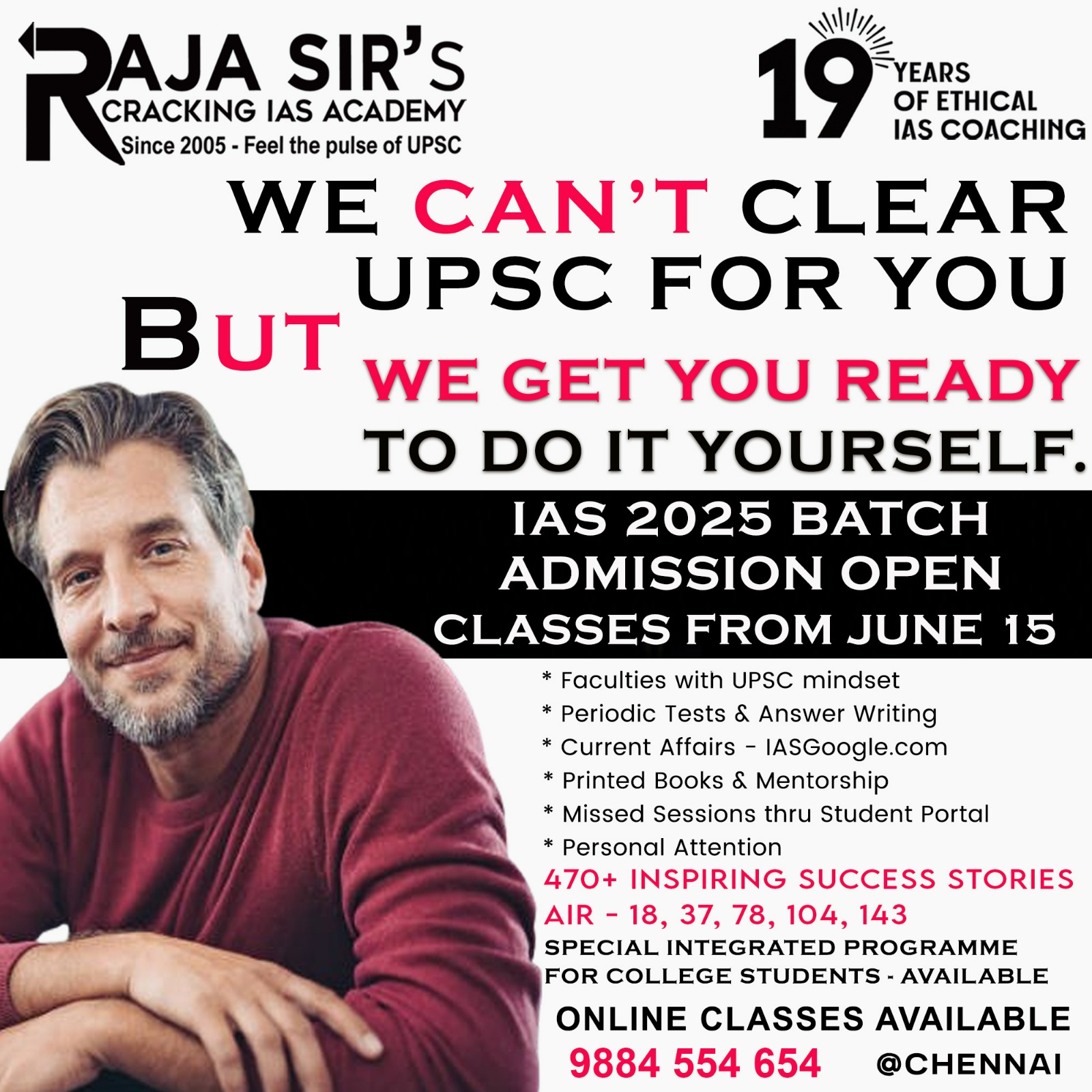
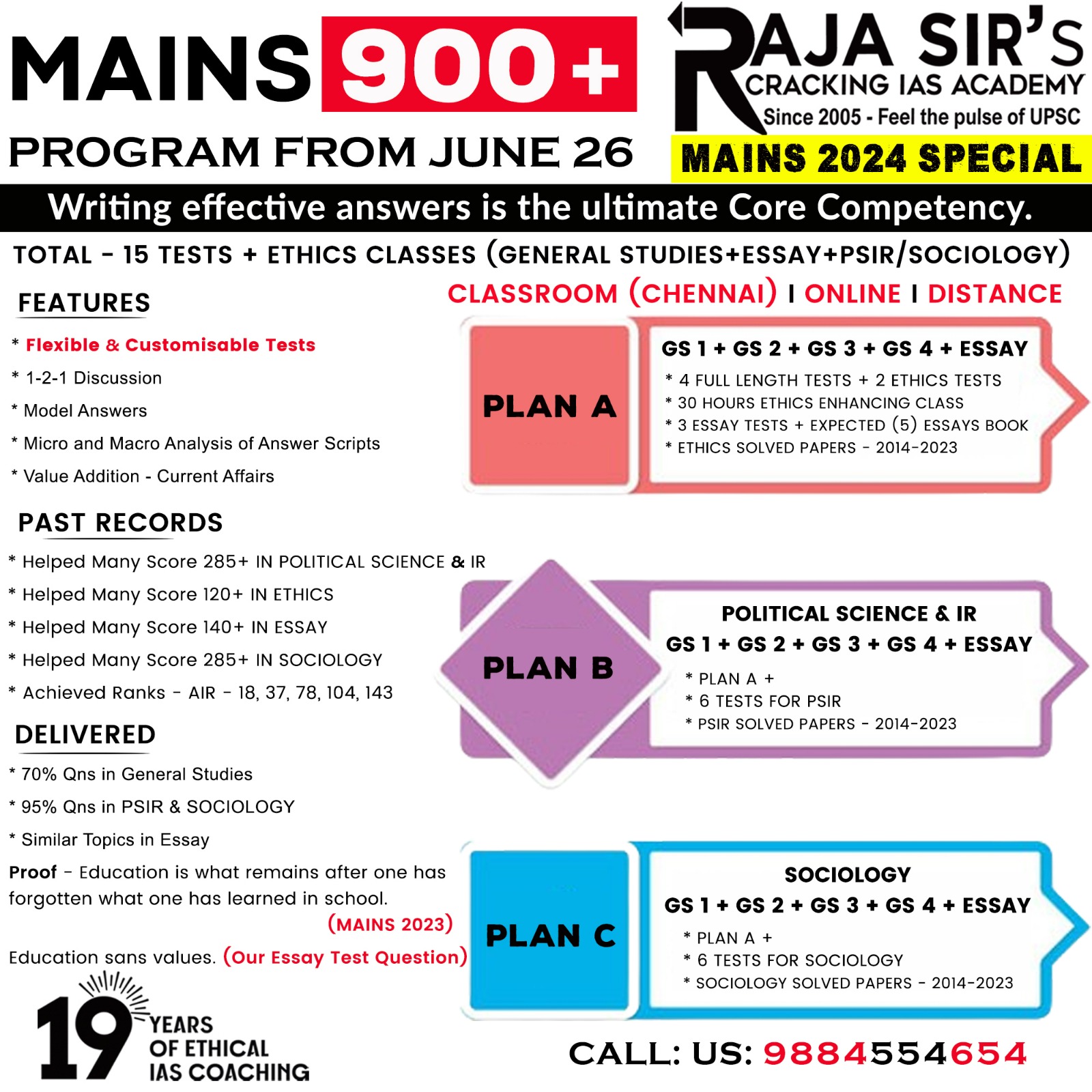
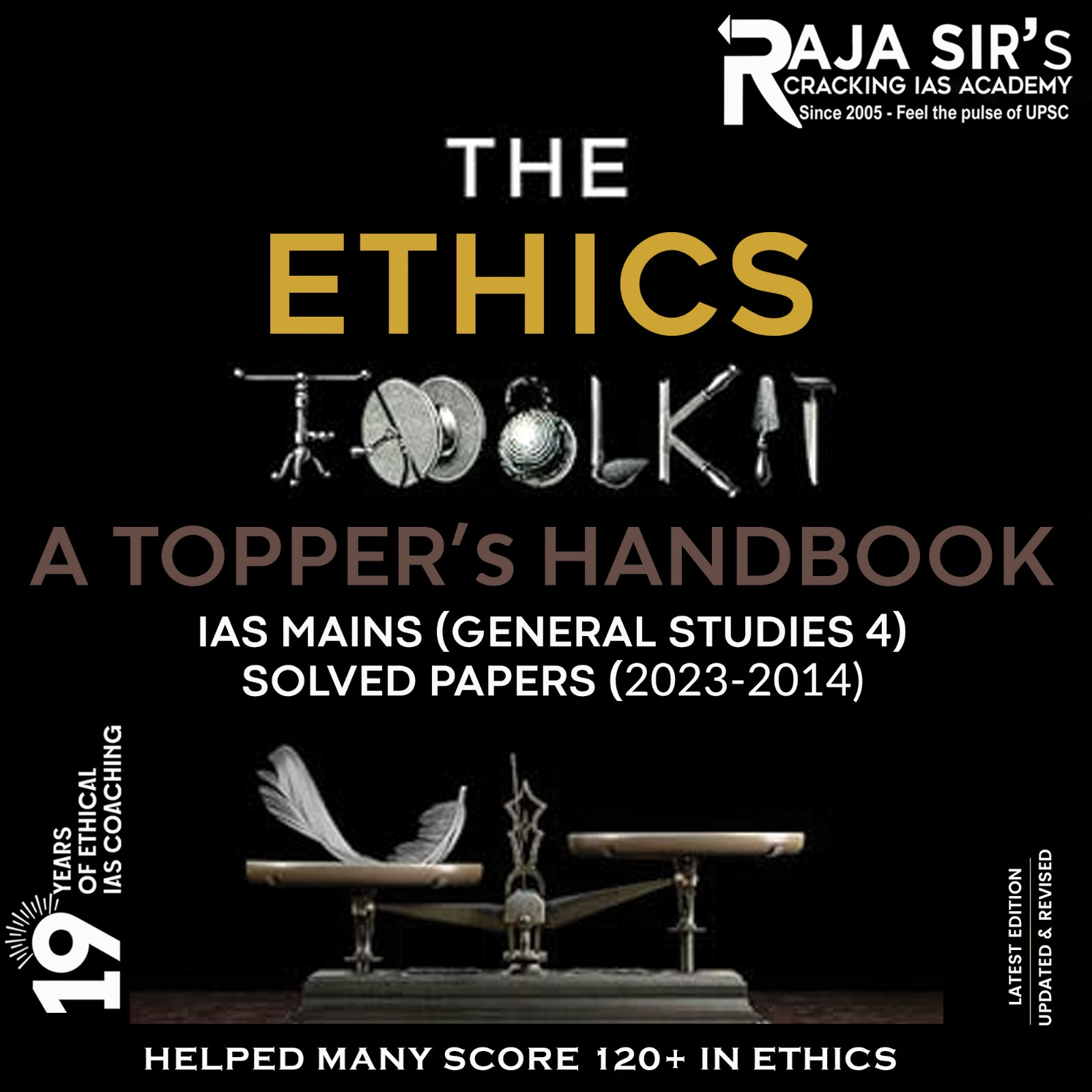
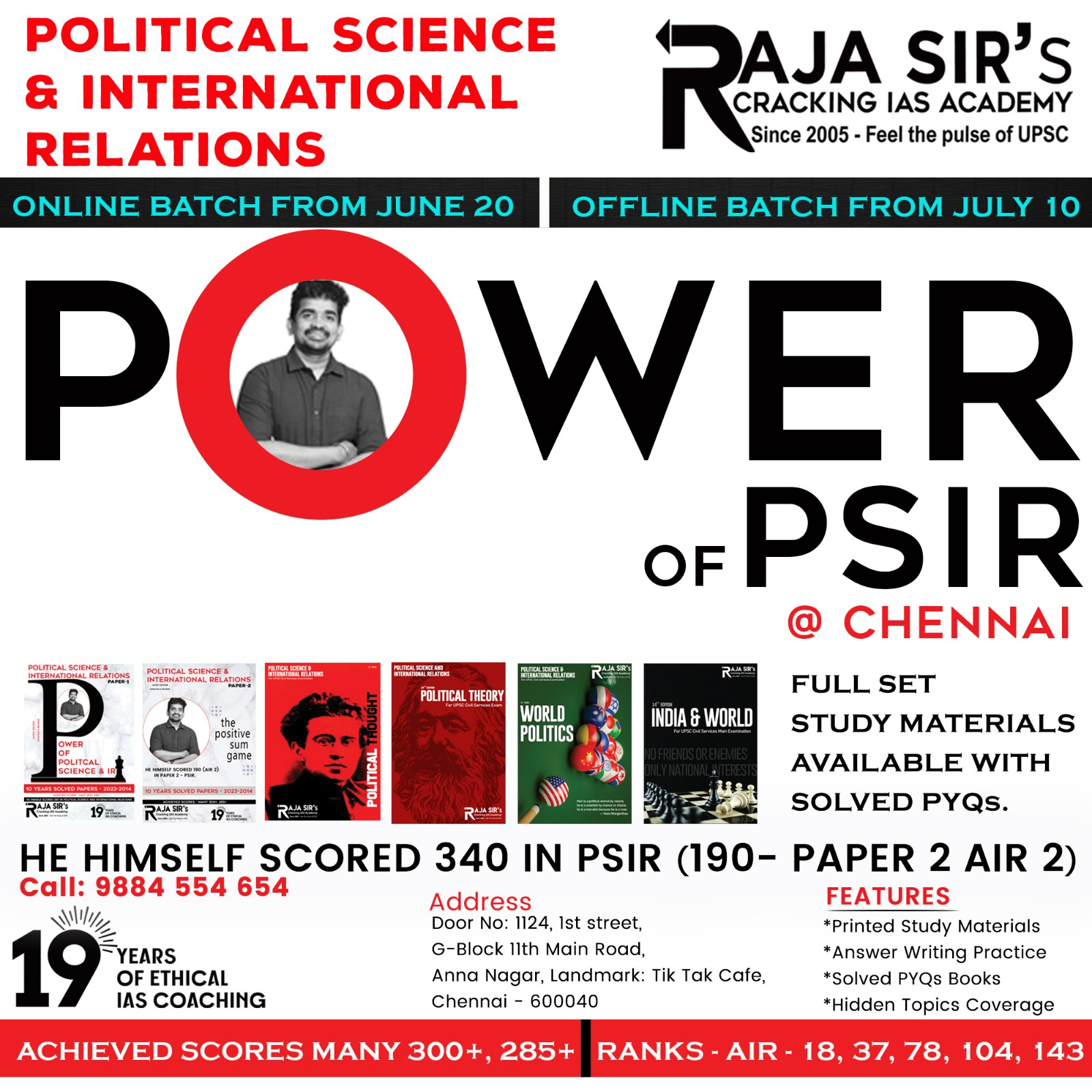
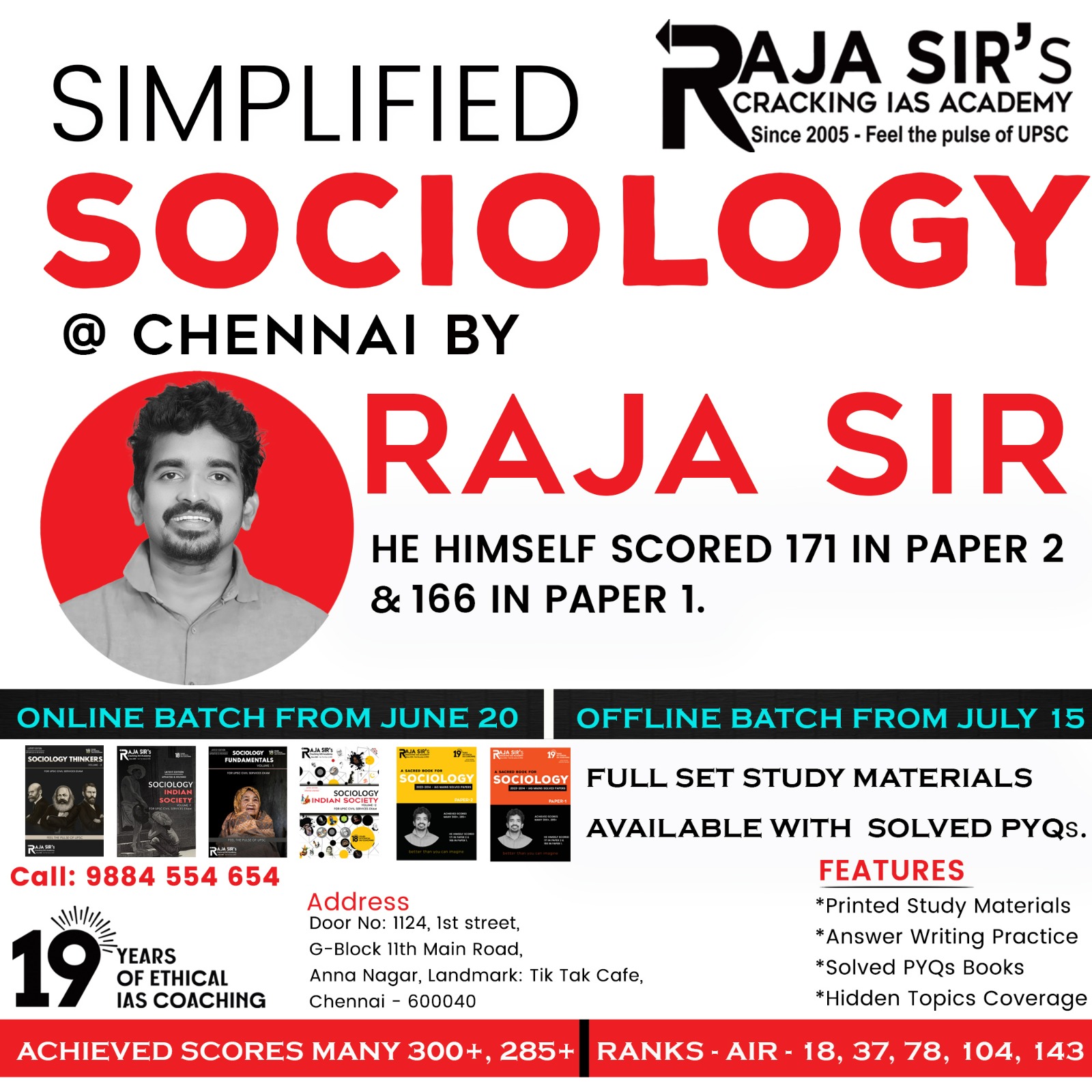
 General Studies
General Studies